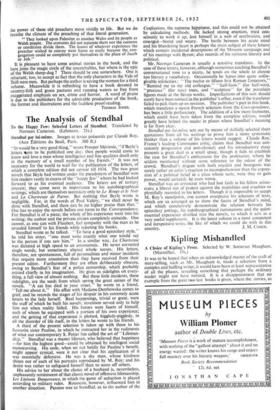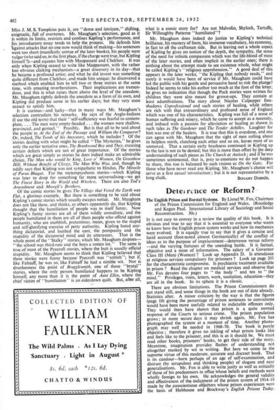Kipling Mishandled
A Choice of Kipling's Prose. Selected by W. Somerset Maugham. (Macmillan. 15s.) IT was to be hoped that when an acknowledged master of the craft of story-telling, such as Mr. Maugham is, made a selection from a complex and baffling writer, it would have been at least representative of all the phases, revealing something that perhaps the ordinary reader might not have noticed. It is a disappointment that no example from the great two last books is given, where the stories, as Miss J. M. S. Tompkins puts it, are "dense and intricate," shifting, enigmatic, full of overtones. Mr. Maugham's selection, good as it is within its limits, restricts and confines Kipling's performance, and his introductory essay tends to help the process. He defends him . hgainst attacks that no one now would think of making—his sentences were too short (manifestly untrue of the later books), his people were vulgar (who said so, in the first place, if the charge were true, but Kipling himself ?)—and equates him with Maupassant and Chekhov. It was only when Kipling ceased to write like Magpassant, with the rather too obvious clicking mechanism—a great discovery in its day—that he became a profound artist; and what he did invent was something quite different from Chekhov, and made him unique; he discovered a method which enabled him to tell two or three stories at the same time, with amazing reverberations. Their implications are tremen- dous, and this is what raises them above the level of the anecdote. Mr. Maugham rightly defends the anecdote as a form of its own, and Kipling did produce some in his earlier days; but they very soon ceased to satisfy him.
It is curious—and lucky—that in many ways Mr. Maugham's selection contradicts his remarks. He says of the Anglo-Indians (I use the old term) that their "self-sufficiency was fearful to contem- plate. . .. The men were empty-headed . .. the women were shallow, provincial, and genteel." Possibly. But is that all to be said about the people in At the End of the Passage and William the Conqueror? Or, indeed, The Tomb of his Ancestors, which he includes ? Of the stories dealing with what might be called "The Mysteries," he gives only the earlier tentative ones, The Brushwood Boy and They, excusing certain defects which are not of great importance. Of the stories which are great simply as stories he does indeed make an admirable choice, The Man who would be King, Love o' Women, On Greenhow Hill, Without Benefit of Clergy, The Man Who Was, and, though he oddly says that Kipling was not sympathetic to Hindus, The Miracle of Purun Bhagat. For the metempsychosis stories—which Kipling was later to drop for something far more universalising—we get The Finest Story in the World and Wireless. There are also Tod's Amendment and Mowgli's Brothers.
Of the comic stories he gives The Village that Voted the Earth was Flat, a glorious example. But there is something to be said about Kipling's comic stories which usually escapes notice. Mr. Maugham does not like these, and thinks, as others apparently do, that Kipling thought that the humiliation of people was in itself funny. Now Kipling's funny stories are all of them wildly unrealistic, and the people humiliated in them are all of them people who offend against humanity, who are snobbish, pretentious, mean, given to the stupid and self-glorifying exercise of petty authority. Kipling hated any- thing dictatorial, and loathed the cant, the pomposity and the stupidity of the dictatorial mind and its utterances. That is the whole point of the "Stalky" stories, which Mr. Maugham despises— "the school was third-rate and the boys a rotten lot." The same is true .of most of the Pyecroft stories, where the butt is usually official stupidity. Mr. Maugham seems to think that Kipling believed that these stories were funny because Pyecroft was "sottish"; but if, like Falstaff, he was so, like Falstaff he had a nimble wit. Nor is drunkenness the point of Brugglesmith, one of those "brutal" stories, where the only person humiliated happens to be Kipling himself, any more than it is the point of Aunt Ellen, where the chief victim of "humiliation" is an eiderdown quilt. But, after all, what is a comic story for? Are not Malvolio, Shylock, Tartuffe, Sir Willoughby Patteme "humiliated"?
Mr. Maugham does indeed do justice to Kipling's technical brilliance, his mastery of form, his immense vocabulary, his economy, in fact to all the craftsman side. But in leaving out a whole aspect of Kipling he gives no notion of the depth, the sympathy, the sense of the need for infinite compassion which was the life-blood of most of the later stories, and often implicit in the earlier ones; there is nothing about the attempt made to see existence whole, what might be called Kipling's "religious apprehension.", A good deal of this appears in the later works, "the Kipling that nobody reads," and surely it would have been of service if Mr. Maugham could have led the public with his gentle and persuasive hand to risk the plunge? Indeed he seems to take his author too much at the foot of the letter; he gives no indication that though the Puck stories were written for children they were also meant for grown-ups. They contain at least adumbrations. The story about Nicolas Culpepper fore- shadows Unprofessional and such stories of healing, while others are rich with that extraordinary and profound sense of England which was one of his characteristics. Kipling was full of a sense of human suffering and misery, which he came to accept as a necessity, and imbued with a passion for alleviation or healing as shown in such tales as The Gardener and The Tender Achilles. Laughter for him was one of the healers. It is true that this is overdone, and one can agree with Mr. Maugham that the sight of men rolling about in helpless mirth, clutching each other and so on, leaves most of us unmoved. That a certain early brashness continued in Kipling up to the last is not to be denied; but this is more than offset by the deep understanding of such pieces as The Church at Antioch ; and if he was sometimes sentimental, that is, prey to emotions we do not happen to share, this too is balanced by such visions as On the Gate. For those who have never read any Kipling, Mr. Maugham's choice will serve as a first casual introduction ; but it is not representative by a



































 Previous page
Previous page